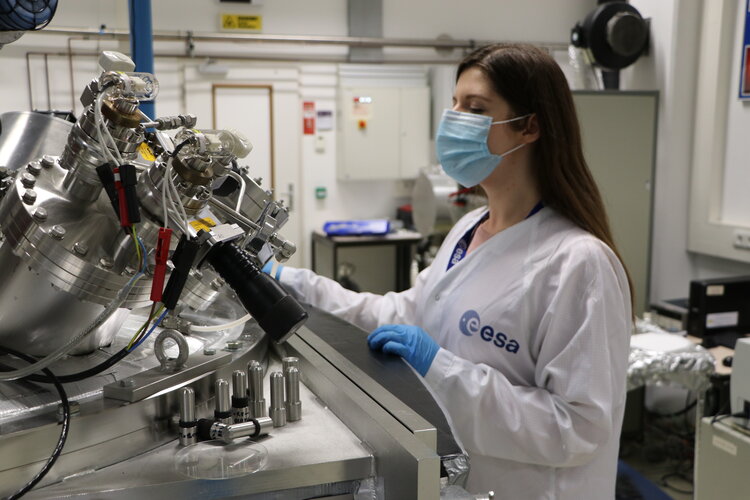While most ESA personnel work from home during the COVID-19 pandemic, essential activities continue to take place on site across Agency establishments while following social distancing protocols.
In ESA’s Materials and Electrical Components Laboratory – one of a suite of labs based at the ESTEC technical centre in Noordwijk, the Netherlands – testing has continued on critical elements for several missions and projects.
For instance, the lab supported the ‘bakeout’ of the Filter Wheel Assembly for the Proba-3 formation flying mission’s main ASPIICS instrument – which will image the Sun’s ghostly surrounding atmosphere, or ‘corona’ from one satellite while another satellite blocks out the blinding solar disk.
The development of this payload was on the critical path, and the test had to be performed at very short notice just before Christmas. The successful bakeout took place with full personal protection measures in place, in order to host the customers arriving from abroad with the flight hardware.
Focusing on mission external elements, thermal endurance tests are currently underway on multilayer insulation (MLI) materials and solar cell assemblies. These tests are being carried out using the eXtreme Temperature Exposure System, XTES and XTES2 facilities – this latter facility having been procured and commissioned during the pandemic – which can reach and maintain incredibly high temperatures for long periods of time. For example, components of an MLI for the JUICE mission to Jupiter are undergoing a three-month test to address their thermal stability under mission representative conditions.
The lab is also supporting the development of new radiation-resistant coatings, by exposing them to ultraviolet and vacuum-ultraviolet light in the Synergistic Temperature Accelerated Radiation 2 (STAR2) facility).
All the environmental tests are aided by materials characterisation and analysis with state-of-the-art equipment, such as microscopic and spectroscopic analysis, thermo-optical measurements, thermal analysis and more. So the lab’s work has not halted, despite COVID-19 restrictions, but is proceeding as smoothly as possible.



 Image:
Simulating space
Image:
Simulating space